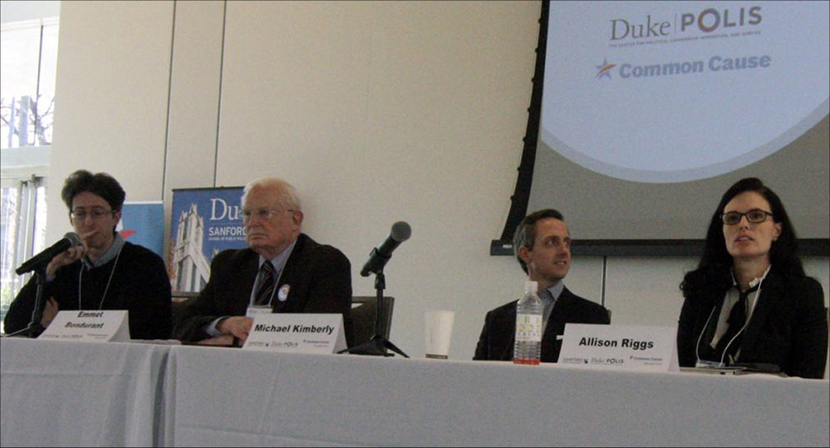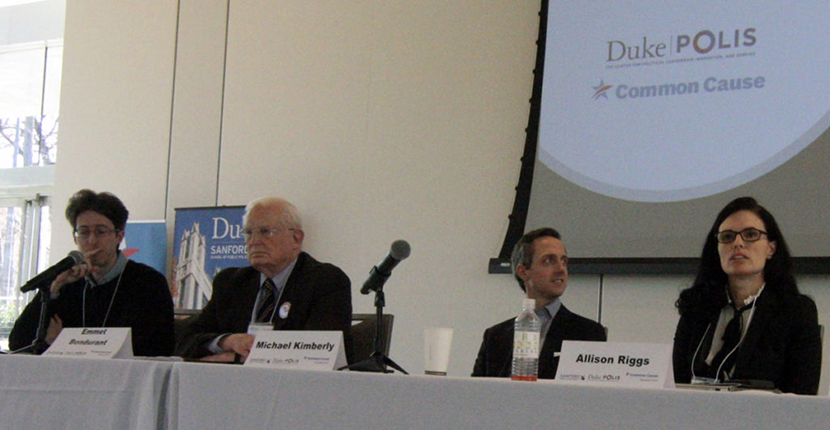Publisher's note: This post appears here courtesy of the Carolina Journal, and written by Dan Way, associate editor.
Attorneys arguing congressional redistricting cases from North Carolina and Maryland say they'll offer U.S. Supreme Court justices an array of legal theories, hoping one will stick and the court will rule extreme partisan redistricting plans unconstitutional.
 Redistricting experts (from left) Thomas Wolf, Emmet Bondurant, Michael Kimberly, and Allison Riggs address a Jan. 25 conference on redistricting at Duke University. (CJ photo by Dan Way)
Redistricting experts (from left) Thomas Wolf, Emmet Bondurant, Michael Kimberly, and Allison Riggs address a Jan. 25 conference on redistricting at Duke University. (CJ photo by Dan Way)
By chance, the lawyers were speaking Friday at a Common Cause redistricting reform event on the Duke University campus hours after the Supreme Court announced it would hold oral arguments on their cases
March 26. They expect a decision in June. The cases have garnered national attention because federal court haven't limited redistricting done for purely partisan gain.
Many legal observers were surprised when the Supreme Court in 2016 returned a case on partisan gerrymandering from Wisconsin,
Gill v. Whitford, to a lower court. The justices said these sorts of cases must be brought one district at a time. The lawsuit is on hold pending the outcome of the North Carolina and Maryland cases.
More than 300 academics, lawyers, activists, students, and redistricting reform advocates from around the country attended the conference. Participants hoped arguments based on an array of legal principles could sway the court.
Allison Riggs, who heads the voting rights program at the Southern Coalition for Social Justice in Durham, is the lead counsel on
League of Women Voters v. Rucho. That congressional redistricting case was consolidated with
Common Cause v. Rucho. The third case the Supreme Court took up is
Benesik v. Lamone, a Maryland case.
Riggs said offering a variety of arguments might work better than coalescing around a single legal point.
"At the end of the day, if any of us win, all of us win."

Redistricting experts (from left) Thomas Wolf, Emmet Bondurant, Michael Kimberly, and Allison Riggs address a Jan. 25 conference on redistricting at Duke University. (CJ photo by Dan Way)
Michael Kimberly, lead counsel in the Maryland case, said the attorneys think using narrow approaches gives them a better chance to succeed.
The North Carolina cases involve the Republican-led General Assembly deliberately drawing maps to give GOP candidates significant advantages in 10 of the state's 13 congressional districts. The Maryland suit was filed after majority Democrats drew election maps to ensure members of their party got elected, especially targeting one district.
Emmet Bondurant, lead counsel in Common Cause v. Rucho, said political gerrymanders violate the U.S. Constitution, which doesn't let states favor or disfavor a class of candidates or dictate electoral outcomes. The Supreme Court has said gerrymandering is a political or policy dispute which doesn't belong in court.
But he thinks Justice Elena Kagan's dissent in the Wisconsin case may have provided an opening to argue extreme gerrymandering violates freedom of association - even though that theory wasn't argued in Gill. Kagan said gerrymanders harm the ability of political parties who aren't in charge to recruit candidates, raise money, and recruit volunteers.
Riggs said the N.C. Constitution protects rights such as freedom of association more than the U.S. Constitution, but court precedents haven't mentioned political gerrymanders.
She said if the plaintiffs prevail, expect a narrow ruling. The Supreme Court might be more conservative than it was in 2016 with Justice Brett Kavanaugh replacing Anthony Kennedy - a swing vote.
Bondurant said he would prefer a ruling limiting state legislatures' ability to affect congressional elections, but not state legislative and other districts. States have differing election rules and standards, unlike the uniformity of congressional elections.
"On the other hand, a ruling that says only extreme gerrymanders are unconstitutional will produce more litigation in the next century than there are people in North Carolina squared," Bondurant said. Legislators will push the limits, and lower courts won't be able to rely on a clear standard.

























